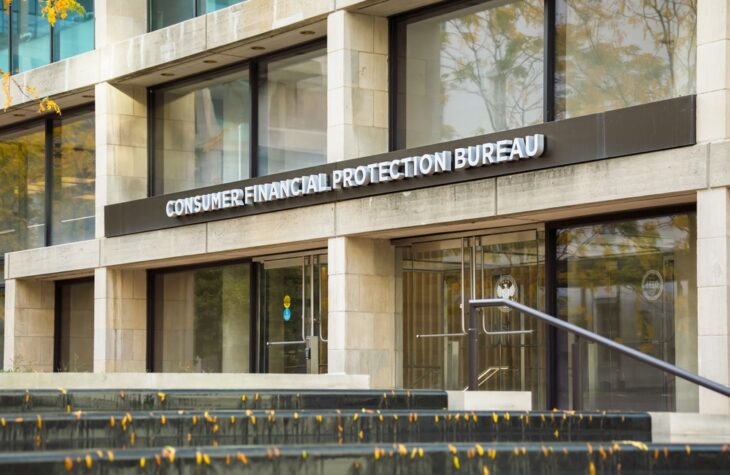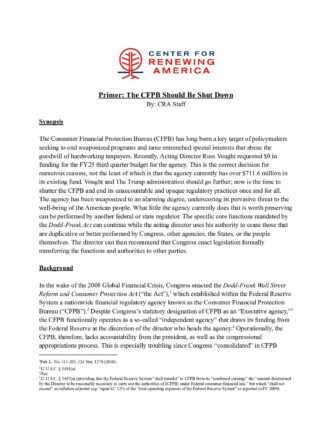
Primer: The CFPB Should Be Shut Down

The CFPB has long operated in an opaque and duplicative fashion that has left it unaccountable to congressional oversight. At best, its functions are duplicative and unnecessary, and at worst, its operations have become increasingly hostile toward the hardworking people and businesses left in the wake of its weaponized regulatory and enforcement actions.
Synopsis
The Consumer Financial Protection Bureau (CFPB) has long been a key target of policymakers seeking to end weaponized programs and tame entrenched special interests that abuse the goodwill of hardworking taxpayers. Recently, Acting Director Russ Vought requested $0 in funding for the FY25 third quarter budget for the agency. This is the correct decision for numerous reasons, not the least of which is that the agency currently has over $711.6 million in its existing fund. Vought and The Trump administration should go further; now is the time to shutter the CFPB and end its unaccountable and opaque regulatory practices once and for all. The agency has been weaponized to an alarming degree, underscoring its pervasive threat to the well-being of the American people. What little the agency currently does that is worth preserving can be performed by another federal or state regulator. The specific core functions mandated by the Dodd-Frank Act can continue while the acting director uses his authority to cease those that are duplicative or better performed by Congress, other agencies, the States, or the people themselves. The director can then recommend that Congress enact legislation formally transferring the functions and authorities to other parties.
Background
In the wake of the 2008 Global Financial Crisis, Congress enacted the Dodd-Frank Wall Street Reform and Consumer Protection Act (“the Act”),1 which established within the Federal Reserve System a nationwide financial regulatory agency known as the Consumer Financial Protection Bureau (“CFPB”).2 Despite Congress’s statutory designation of CFPB as an “Executive agency,”3 the CFPB functionally operates as a so-called “independent agency” that draws its funding from the Federal Reserve at the discretion of the director who heads the agency.4 Operationally, the CFPB, therefore, lacks accountability from the president, as well as the congressional appropriations process. This is especially troubling since Congress “consolidated” in CFPB broad “rulemaking, enforcement, and adjudicatory authority” to administer a “large body of financial consumer protection laws,” which comprise at least 18 different statutory schemes governing the offering and provision of financial products and services.5 In consequence, CFPB wields “vast rulemaking, enforcement, and adjudicatory authority over a significant portion of the U.S. economy”6 while remaining largely unaccountable to the political branches of the government.
Key Problem #1: Duplication
The CFPB has 14 core functions, all of which are duplicative of other federal or state responsibilities. For example, CFPB has a supervisory and regulatory role over financial institutions. So too does the Federal Reserve (Fed), which oversees banks, sets monetary policy, and enforces consumer protections. The Office of the Comptroller of the Currency (OCC) regulates national banks and federal savings associations. The Federal Deposit Insurance Corporation (FDIC) supervises state-chartered banks that are not in the Fed system. The National Credit Union Administration (NCUA) regulates federally insured credit unions.
At the state level, state banking regulators and state financial services departments oversee state-chartered banks and financial institutions. CFPB enforcement actions are duplicative of authorities of the Department of Justice (DOJ), which enforces fair lending and investigates fraud, the Federal Trade Commission (FTC), which regulates unfair business practices, and the Securities and Exchange Commission (SEC), which investigates fraud in securities and investments. At the state level, state Attorneys General and state financial regulators bring enforcement actions against bad actors and enforce consumer protection laws.
The much-discussed authority to ensure fair lending practices and anti-discrimination rules is also carried out at the federal level by the DOJ’s Civil Rights Division, the Fed, OCC, FDIC, NCUA, and the Department of Housing and Urban Development (HUD). States also have civil rights agencies and housing authorities to ensure non-discrimination.
Key Problem #2: Weaponization
In the twilight of the Biden administration, the CFPB sued the operators of the banking app Zelle and three of its charter banks for supposedly “allowing fraud to fester” on the app. This was just one in a long series of events in which the Bureau stretched the definition of its powers in a way that threatened the liberty of the American people. Never mind that Zelle is not a bank and is as much a victim of fraud as its users induced to make fraudulent payments.
Entrepreneurs Mark Zuckerberg and Marc Andreessen have claimed that the CFPB has harassed them and is weaponized against perceived political opponents of the Biden administration. According to Zuckerberg, the CFPB began investigating Meta, which is not a bank, as part of the administration’s broader efforts to censor content on social media platforms.7 Andreessen said CFPB is “terrorizing anybody who tries to do anything in financial services” if they are from the politically disfavored half of the country.8
The evidence of the CFPB’s political weaponization goes back to the Obama era, when the Federal Deposit Insurance Commission (FDIC) inspector general found it had played a key role in “Operation Choke Point,” in which banks were pressured to deny services to specific disfavored industries.9 Among the many industries targeted in Operation Choke Point were firearms dealers, pawn shops, and payday lenders. The weaponization of the CFPB against the 2nd Amendment via the process of debanking firearms dealers, by itself, could be an entire research paper given the scale of abuse, but for the purpose of brevity, we will only mention it in passing here.
In this new era, disfavored political targets have been the crypto and decentralized finance sectors. Andreessen has explained that tech founders backed by a16z (a venture capital firm of Andreessen Horowitz) have faced debanking in the past four years.10 Melania Trump and other venture capitalists invested in crypto also faced similar debanking.11
CFPB also went after a Chicago-based nonbank mortgage firm, Townstone Financial, for supposed discrimination and to effectively censor the owner’s speech.12 Townstone settled with CFPB in November 2024 and had to pay a $105,000 fine.13 Others have reported CFPB pressured financial institutions to provide loans to illegal immigrants.14
The threat of debanking, wherein legitimate entities are blocked from financial services, kills innovation and growth. The day-to-day business operations, like making payroll and payments to vendors, become impossible to carry out, and most companies will quickly collapse.
As if mere debanking was not problematic enough, CFPB also uses its collected penalty payments to fund woke non-profit activist groups.15
Proposed Reforms
In light of the duplicative work and weaponization of the CFPB, Congress should shut it down and, to the extent necessary, reassign its statutory duties to regulate the offering and provision of financial products and services to a complementary cabinet department or sub-cabinet level agency or office elsewhere in the Executive Branch––one that is directly answerable to a cabinet officer and under the centralized command of the President––such as the Department of the Treasury or the Department of Justice.
Reform 1: Reorganize Enforcement Priorities and Cut off Funding
The director of the CFPB is vested with broad authority and discretion. Past directors have exercised these authorities in ways that have run rough-shod over what is just, fair, transparent, and according to the rule of law. The Trump administration has the opportunity to systematically identify all of the CFPB’s functions and authorities that are better performed by Congress, other agencies, the States, or reserved to the People. Having identified such functions, the director can refrain from such functions as a matter of case-by-case discretion in deference to better-situated regulators. But an essential balance must be struck. Since CFPB can be compelled by courts under the Administrative Procedure Act (“APA”) to take all “agency action[s] unlawfully withheld or unreasonably delayed” pursuant to its copious list of duties under the Federal consumer financial laws,16 the director should take proper precaution to ensure that the Federal consumer financial laws are not left entirely unadministered or severely underadministered.17 The director can also recommend that Congress enact legislation formally transferring the functions and authorities to another cabinet department or sub-cabinet level agency or office that administers other statutes which govern the financial sector.
The statute prescribing CFPB’s funding mechanism provides that the Federal Reserve System “shall transfer” to CFPB from its “combined earnings” the “amount determined by the director to be reasonably necessary to carry out the authorities of [CFPB] under Federal consumer financial law,” but which “shall not exceed” an inflation-adjusted cap “equal to” 12% of the “total operating expenses of the Federal Reserve System” as reported in FY 2009.18 For starters, the director should not seek funding for the agency in an amount exceeding the President’s budget request. Further than that, because CFPB can only draw from the Federal Reserve’s “combined earnings,” i.e., the central bank’s profits, it has been suggested that the Federal Reserve has been unlawfully financing the CFPB for several years now, due to the fact that it “hasn’t had any profits since August 2022.”19 Therefore the director, at the behest of the president, should cut off the transfer of any Federal Reserve funds unless and until the central bank turns a profit and such transfer would comport with CFPB’s funding statute. But here again, an important balance must be struck on account of the APA empowering courts to compel CFPB to take any “agency action unlawfully withheld or unreasonably delayed” under the Federal consumer financial laws.20 Accordingly, when the Federal Reserve has profits that may be statutorily transferred to CFPB, the President should dictate that CFPB’s funding withdrawal be lowered to the maximum degree approximated to enable CFPB to retain sufficient agency manpower to carry out its bare minimum statutory duties under the Federal consumer financial laws.
Reform 2: Halt New Rulemaking
The CFPB is required to regulate the offering and provision of consumer financial products and services under laws like the Fair Credit Reporting Act, Equal Credit Opportunity Act, Fair Credit Billing Act, Fair Debt Collection Practices Act, Home Owners Protection Act, Home Ownership and Equity Protection Act, Home Mortgage Disclosure Act, Interstate Land Sales Full Disclosure Act, and Truth in Lending and Savings Acts. As an initial step toward reducing onerous regulatory burdens that impose significant costs or that exceed the scope of what Congress actually delegated to CFPB under its respective statutes, the director could slow down or halt the adoption of any new implementing rules or regulations that would impose additional regulatory hurdles and compliance costs on regulated entities. Existing rules would remain in place, but the CFPB could reduce any further efforts to expand the unlawful or excessive red tape. To go further, the director could do a close legal review of the agency’s own rule-making power, i.e., define the boundaries of the agency’s legal authority for rulemaking very strictly under the language of its implementing statutes, and for any past rulemaking that exceeded those boundaries, begin to formally remove such rules based on the foregoing analysis (see below).
Reform 3: Cut Staff and Reorganize the Bureau
The director should identify those actively involved in the weaponization of CFPB power and fire them as part of a broader reduction of the bureau. The director could reduce hiring, limit promotions, or reorganize the CFPB’s internal structure to reduce weaponized investigations and political targeting. Regional offices could be closed, consolidating operations in Washington, D.C. or elsewhere.
Reform 4: Focus CFPB on Statutory Objectives
Pursuant to Section 1021(b)(3) of the Dodd-Frank Act, one of the CFPB’s statutory objectives is to ensure that “outdated, unnecessary, or unduly burdensome regulations are regularly identified and addressed in order to reduce unwarranted regulatory burdens.”21 The CFPB has quite often ignored this statutory responsibility. In order to refocus CFPB on its statutory responsibilities, a Request for Information (RFI) should be issued seeking public comment on whether any aspect of any regulation issued pursuant to federal consumer financial law is “outdated, unnecessary, or unduly burdensome.” After comments are reviewed, rulemakings to rescind or repeal all regulations identified as outdated, unnecessary, or unduly burdensome should be prepared. A wise starting point would be all such rules and regulations that likely transgress the boundaries of CFPB’s congressionally delegated statutory authority under the major questions doctrine22 or Loper Bright doctrine.23
Conclusion
The CFPB has long operated in an opaque and duplicative fashion that has left it unaccountable to congressional oversight. At best, its functions are duplicative and unnecessary, and at worst, its operations have become increasingly hostile toward the hardworking people and businesses left in the wake of its weaponized regulatory and enforcement actions. The agency should be abolished. Until Congress passes legislation that ends its existence, the acting director should make every effort to limit CFPB’s onerous impact by restricting the agency down to its bare minimum functions and personnel power.
Like so many other failed institutions and programs in the D.C. swamp, the CFPB has only harmed those it was ostensibly tasked with helping. The era of weaponized government is coming to an end. The CFPB must go with it.
Endnotes
1. Pub. L. No. 111-203, 124 Stat. 1376 (2010).
2. 12 U.S.C. § 5491(a).
3. Ibid.
4. 12 U.S.C. § 5497(a) (providing that the Federal Reserve System “shall transfer” to CFPB from its “combined earnings” the “amount determined by the Director to be reasonably necessary to carry out the authorities of [CFPB] under Federal consumer financial law,” but which “shall not exceed” an inflation-adjusted cap “equal to” 12% of the “total operating expenses of the Federal Reserve System” as reported in FY 2009).
5. CFPB v. Cmty. Fin. Servs. Ass’n of Am., Ltd., 601 U.S. 416, 421–22 (2024); Seila Law LLC v. CFPB, 591 U.S. 197, 206–07 (2020). These statutes include, but are not limited to: the Fair Credit Reporting Act, the Fair Credit Billing Act, the Fair Debt Collection Practices Act, the Home Owners Protection Act, the Home Ownership and Equity Protection Act, the Home Mortgage Disclosure Act, the Interstate Land Sales Full Disclosure Act, the Truth in Lending and Savings Acts, and certain provisions of the Federal Deposit Insurance Act.
6. Seila Law LLC, 591 U.S. at 203.
7. Berlau, John. Washington, Stone. (Jan. 31, 2025). “Trump Must Cancel CFPB Censorship.” https://cei.org/opeds_articles/trump-must-cancel-cfpb-censorship/
8. Ibid.
9. Berlau, John. (Dec. 18, 2024). “Google Case Just the Beginning of CFPB Fintech Power Grab.” https://cei.org/blog/google-case-just-the-beginning-of-cfpb-fintech-power-grab/
10. Gupta, Aditya. (Jan. 30, 2025). “Debanking is the New Censorship.” The Stanford Review. https://stanfordreview.org/debanking-is-the-new-censorship-an-interview-with-sequoia-capitals-roelof-botha/
11. https://x.com/jaekim1089208/status/1888580856530518310?s=46&t=yoRaohotqXP0omWUE7Z7EQ
12. Berlau, John. Washington, Stone. (Jan. 31, 2025). “Trump Must Cancel CFPB Censorship.” https://cei.org/opeds_articles/trump-must-cancel-cfpb-censorship/
13. Ibid.
14. Kessler, Will. (Oct. 12, 2023). “Biden Admin Threatens Banks That Refuse to Lend Money to Illegal Immigrants.” The Daily Caller. https://dailycaller.com/2023/10/12/biden-admin-threatens-banks-refuse-lend-money-illegal-immigrants/
15. IBD editorial. (June, 15, 2015). “CFPB Joins Justice in Shaking Down Banks for Democrat Activist Groups.” https://www.investors.com/politics/editorials/cfpb-diverts-civil-penalty-funds-to-democrat-activist-groups/
16. 5 U.S.C. § 706(1).
17. See Heckler v. Chaney, 470 U.S. 821, 833, n. 4 (1985) (noting that situations where agencies have ‘consciously and expressly adopted a general policy’ that is so extreme as to amount to an abdication of its statutory responsibilities . . . [are] not ‘committed to agency discretion,’” and thus do not preclude judicial review and intervention).
18. 12 U.S.C. § 5497(a).
19. E.J. Antoni, Ph.D. (@RealEJAntoni), “How Trump Can Kill the CFPB, Instantly,” X (Jan. 10, 2025), https://x.com/RealEJAntoni/status/1877834143490609595.
20. 5 U.S.C. § 706(1).
21. 12 U.S.C. § 5511(b)(3).
22. See West Virginia v. EPA, 597 U.S. 697, 716, 721–23 (2022) (explaining that under the “major questions doctrine,” agencies must be able to point to “clear congressional authorization” for their assertions of authority to make policy decisions of “vast economic and political significance” (cleaned up)).
23. See Loper Bright Enterprises v. Raimondo, 144 S. Ct. 2244, 2263 (2024) (“When the best reading of a statute is that it delegates discretionary authority to an agency, the role of the reviewing court under the APA is, as always, to independently interpret the statute and effectuate the will of Congress subject to constitutional limits.” (cleaned up)); see, e.g., CFPB v. Townstone Fin., Inc., 107 F.4th 768 (7th Cir. 2024) (upholding, under Loper Bright, CFPB’s interpretation of the Equal Credit Opportunity Act––i.e., that it vests broad discretionary authority in CFPB to promulgate the challenged portions of its implementing regulation––as “consistent” with the statute).




